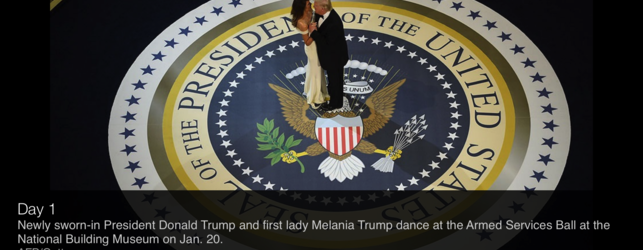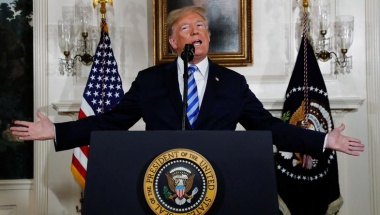JERUSALEM – Nickolay Mladenov speaks over a patchy phone line on his way to the airport, once again.
“Everybody, literally everybody, needs to step back from the brink,” urged the U.N. special coordinator for the peace process, before his trip last week to the United Arab Emirates to meet its foreign minister.
In recent months, Mladenov has become the point man for efforts to reverse the rising risk of war between Israel and Hamas and to kick-start Gaza’s economy, shuttling among Israelis, Palestinians, Egyptians and potential donors in the Persian Gulf.
His flurry of Middle East diplomacy comes at a time when Israeli-Palestinian violence is spiking, living conditions in the Gaza Strip are rapidly deteriorating — and the Trump administration’s effort to play the traditional U.S. role of peace broker is flailing.
We’ve said all along that in order to reach a comprehensive peace agreement, we need to somehow figure out how to resolve Gaza, not just from a humanitarian level,
Mladenov, a Bulgarian diplomat, played a key role in brokering a partial cease-fire last weekend as violence flared, with Israel and Hamas engaging in the most intense round of daytime fighting since the 2014 Gaza war.
But Israel is insisting that Hamas, which controls Gaza, put a stop to the campaign of flaming kites and balloons being launched into its territory. Rocket sirens sounded again in southern Israel on Thursday as mortar shells were fired out of Gaza.
With Gaza posing a major security concern for Israel, the Trump administration has also turned its focus to the humanitarian situation in the 140-square-mile Palestinian enclave in recent months.
Gaza was a prominent talking point when U.S. Middle East envoy Jason Greenblatt and presidential adviser and son-in-law Jared Kushner visited the region last month. Addressing the situation in Gaza is seen by U.S. officials as a way to get diplomatic traction at a time when their efforts at promoting a wider Middle East peace plan are hobbled by rocky relations with the Palestinian Authority.
“We’ve said all along that in order to reach a comprehensive peace agreement, we need to somehow figure out how to resolve Gaza, not just from a humanitarian level,” said a senior Trump administration official. “You have 2 million Gazans suffering there because of Hamas, in our opinion. But we know you can’t reach a peace agreement that puts an end to all claims – not just the refugee claims but everything – without figuring out how to resolve the situation in Gaza.”
But the United States has undermined its ability to promote even a Gaza-focused initiative by actions that Palestinians consider punitive, including recognizing Jerusalem as Israel’s capital and cutting aid for the Palestinians. In January, the United States slashed its funding to the United Nations Works and Relief Agency (UNWRA) by $300 million. More than two-thirds of Gaza’s twp million residents rely on aid from the agency.
“Everything the U.S. touches, it makes it a very hard sell,” said Ofer Zalzberg, an analyst at International Crisis Group, who said that the U.S. has embarked on a path of “coercive diplomacy” with the Palestinians that has not paid off.
The Americans have cut aid for UNWRA, so how dare they speak about the humanitarian situation in Gaza
Palestinian leaders last month slammed press reports that the U.S. was arranging an economic initiative for Gaza. The Palestinian Authority accused the White House of trying to divide Palestinians, by focusing on Gaza in isolation from the Israeli-occupied West Bank, and reducing the political conflict between Israelis and Palestinians to a purely humanitarian one.
“The Americans have cut aid for UNWRA, so how dare they speak about the humanitarian situation in Gaza,” said Saeb Erekat, the Palestinian Authority’s chief negotiator. “The Americans have disqualified themselves from any kind of role.”
Mladenov’s efforts include securing funding for a range of infrastructure in Gaza, including water and power projects.
He declined to detail the level of funding secured for these projects but said all sides have agreed on them. Although a range of ideas has been floated, from building an industrial zone in Egypt’s Sinai to an airport or sea port in Cyprus, he said his focus is on projects that can be developed immediately.
When asked about the U.S. role, Mladenov said he is working with “all potential donors but our key partners are the Palestinian Authority, Israel and Egypt. There is only one plan for Gaza, and that’s our plan right now,” he said.
An emergency donor meeting for Gaza organized by the White House in March raised valid ideas, he said, but many of the projects discussed there would be long term.
Unemployment in Gaza is nearly 50 percent, higher among the youth, with the economy stifled by restrictions on movement and trade by Israel as well as Egypt. Within the past week, Israel has also restricted the flow of goods through Kerem Shalom, the main cargo crossing between Israel and Gaza, allowing only urgent humanitarian supplies.
A growing sense of hopelessness among young Palestinian men has found its expression in weekly protests along the border fence separating Gaza from Israel. Thousands of Palestinians have been shot by Israeli soldiers and more than 130 killed, according to health officials in Gaza.
Israel says the situation is increasingly urgent. Tzachi Hanegbi, Israel’s minister for regional cooperation, said Israel “wholeheartedly” supports Mladenov’s efforts. Without progress, Hanegbi said, “soon you are going to see a devastating crisis.”
He said he chooses to be optimistic “because the alternative is devastating.”
If there is another war, if there is no reconciliation with the West Bank, if people continue to live in abject poverty — none of these ideas for the future will be possible
But Mladenov says any solution for Gaza must be based on reconciling Hamas and the Palestinian Authority, which controls the West Bank, and that could be difficult. The two Palestinian factions have been feuding for more than a decade.
“There are many thoughts from different parties,” said Hamas official Ghazi Hamad. “But the main plan that I can call a plan is Mladenov’s plan. Hamas has no objection on any effort to ease the life of Gaza.” He added that should come without a “political price” for Hamas.
Hamas officials have said they are willing to join a Palestinian unity government in Gaza and support fresh elections. But reconciliation talks with the Palestinian Authority have long stumbled over issues including whether Hamas can retain its control of arms in Gaza. In the meantime, the possibility of a new conflict is drawing closer. The Israeli military says it is prepared for a large-scale military operation.
“If there is another war, if there is no reconciliation with the West Bank, if people continue to live in abject poverty — none of these ideas for the future will be possible,” Mladenov says.




















